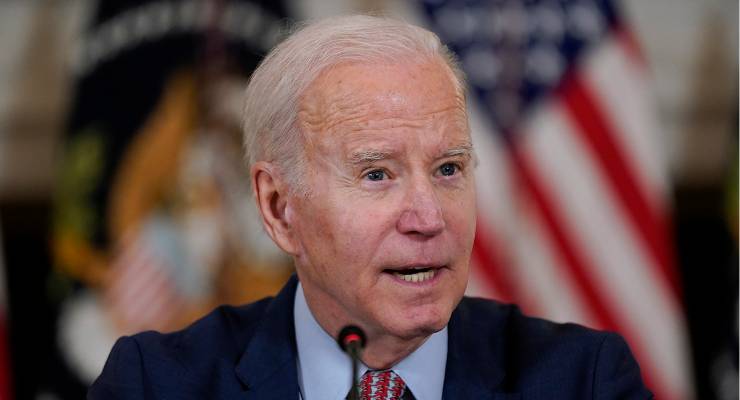
Last week, while much of the world’s media focused on Donald Trump becoming the first former United States president to be indicted on criminal charges, current officeholder Joe Biden issued the second veto of his presidency.
Biden has been a fairly subdued issuer of vetoes so far, although this tracks with recent previous administrations. Both the Trump and Obama presidencies issued the vast majority of theirs during their final two years in office, when faced with increasingly hostile arrangements in Congress. However, it’s the subject of Biden’s vetoes that is particularly significant.
Last week’s veto harpooned a resolution that would have rescinded Biden’s legislation restoring federal protections for hundreds of thousands of rivers, lakes, streams and wetlands across the US. Biden’s water protections hit predictable resistance at the hands of farmers, oil and gas producers, real estate developers and the Republican Party on account of the regulatory burden it places on business and agriculture. The vote on the resolution attracted support from four Democratic senators, including perpetual troublemaker Joe Manchin and Arizona independent Kyrsten Sinema.
This is the second time in less than a month Biden has used this power for environmental issues. The first was particularly significant — killing a Republican push to ban the government from considering environmental impacts or potential lawsuits when making investment decisions for people’s retirement plans.
“In his first veto, Biden just sided with woke Wall Street over workers,” Republican House Speaker Kevin McCarthy responded at the time. “Tells you exactly where his priorities lie … it’s clear Biden wants Wall Street to use your retirement savings to fund his far-left political causes.”
This is part of a long-running push among Republicans at both state and federal levels to target the concept of environmental, social and governance (ESG) investing. Mike Pence and Ron DeSantis, both possible presidential candidates in 2024, have latched on to the issue, and over the past two years, Republican lawmakers in at least 12 states have announced plans to introduce bills attacking ESG investing.
This has come in the form of either barring state money managers from considering ESG factors when investing, or blacklisting certain firms, such as in a recent case in West Virginia. The state barred five of the largest banks in the US, including Goldman Sachs, from receiving state banking contracts because the banks were apparently involved in “boycotts of fossil fuel companies” — something Sachs and others have denied.
It’s almost as if some Republicans aren’t so thrilled by the invisible guiding hand of the market when it proves politically inconvenient.
Closer to home, Australian super funds find themselves at the other end of this push. Despite a requirement that super funds specifically consider their members’ “best financial interest” when investing (a phrase introduced by the Morrison government’s “Your Future, Your Super” legislation, which many felt was an attempt to stymie ESG investment), it would be difficult to find a major fund that didn’t have an ESG team.
In fact, many are currently having to dilute their claims regarding ethical investing, not on account of pressure to avoid such investments in the first place, but because of a new crackdown on “greenwashing” or misrepresenting the environmental impact of those investments.
In February, Mercer Super Australia — a huge retail superannuation fund — became the first company to face court action for alleged greenwashing conduct, with the Australian Securities and Investments Commission alleging Mercer misled members of its “Sustainable Plus” option about the fund’s level of investment in fossil fuel companies.








Good for Biden. What a thankless job being a Democrat president must be. You’re up against the worship of ignorance, the power of the dollar, the backstabbing from your own side, a media that rejoices in lies and conspiracy theory, and the constant threat of a civil war if you try to push any evidence-based agenda too far.
So the Republicans support regulating private businesses to prevent them from providing abortion support but are opposed to regulating businesses to prevent them from destroying the planet (for the unborn)?
It shouldn’t be this easy to point out hypocrisy.
I’m sorry why would frame the opposition to Biden’s environmental bills as being inevitable:
“on account of the regulatory burden it places on business and agriculture”?
Would you use the same framing for the regulation of say crack cocaine or contract killing?
They place a “regulatory burden” on the mafia, and the mafia contribute significantly to the economy and employ a lot of people.
Surely there are things one simply cannot do?
Because the harm it causes to most people outweighs the benefits to most people.
And also because society shouldn’t have to pick up the costs for someone else’s profit.
E S and G investing is to maintain and sustain and retain our lives, futures, planet, and for us all. Nothing else will do, will be satisfactory.
Thank God for Biden – a sane and sober president unlike his predecessor.
Unfortunately the US ‘democratic’ political system has failed. There’s virtually no chance of independents or minor parties being elected.
I don’t hold much hope for a similar sane successor. for Biden. I don’t even see potential Democrat figures being groomed. Surely there must be many who could the job.
The two huge captured parties have a stranglehold on their democracy. I think the only way out is constitutional change and what is the chance of 50 states agreeing to that.
Fist they need truth in media laws to stop the lies, particularly by the Murdoch media but also seeded throughout the internet. It is an uphill battle but it must start somewhere.